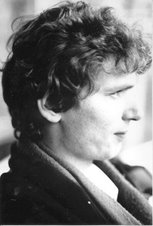
"What will that innocent lamb tell her friends when she grows up? My father is Barsam Tchakhmakhchian, my great-uncle is Dikran Stamboulian, his father is Varvant Istanboulian, my name is Armanoush Tchakhmakhchian, all my family tree has been Something Somethingian, and I am the grandchild of genocide survivors who lost all their relatives at the hands of Turkish butchers in 1915, but I myself have been brainwashed to deny the genocide because I was raised by some Turk named Mustafa! What kind of a joke is that!"
This passage, shouted out by one of the characters in The Bastard of Istanbul, is what got Elif Shafak in court for "insulting Turkishness", another case based on the by now infamous Article 301. The case against Shafak was eventually dropped, but she became well-known as one of the very few Turkish authors, together with for example Nobel Prize winner Orhan Pamuk, who was not afraid to tackle the issue of the Armenian genocide in a way that was not well appreciated (to put it mildly) by the Turkish authorities.
Armanoush is the child of an Armenian father and an American mother who remarried with a Turkish man. She divides her time between her mother in Arizona and her father's family in San Fransisco. When she feels something in her identity is missing, she sets off on a trip to Istanbul, to stay with her stepfather's family and find out more about her past. In Istanbul, she becomes fast friends with Asya, the youngest member of her stepfather's family.
The Armenian genocide is a major theme in the story, but eventually it is one of the ways the bigger theme of dealing with the past is worked out. All of the major characters have something in their past they have to deal with, either by accepting it or denying it or, even before acceptation or denial, by trying to find out what their past actually is.
The first chapter was hard to finish - I didn't like the writing style, very "flowering" with long sentences and many adjectives. I regularly had to reread a sentence to actually get the meaning. Fortunately, that was only the first chapter, after that I either got used to the language or the style changed (I guess it was a bit of both). Anyway, I got hooked and, having started the book on Saturday afternoon, had finished it Sunday before dinner.
It is a beautifully told story with an interesting plot, if somewhat constructed at times. I felt as if the author wanted to represent all the different opinions on the Armenian genocide in the book. There is the staunch Turkish nationalist who is absolutely convinced that there was no genocide and that, on the contrary, the Armenians killed the Turks en masse. There is the Turk who acknowledges that the Turks did horrible things to the Armenians during World War I, but that that was in the past and that the current generation is not responsible for it. There is also the Armenian who thinks that Armenians still living in Turkey are being repressed and who is convinced that they'd be better off emigrating. There is the somewhat skeptical Armenian who thinks that striving for recognition of the genocide is the only thing that still binds the Diaspora and that once recognition by Turkey has been achieved, the Diaspora will fall apart. Finally there is the Armenian who was born and raised in Istanbul, feels Istanbulite first and foremost and doesn't want to live anywhere else. This urge to represent all those opinions led to superfluous scenes and even characters in my opinion. I ended up quickly reading the superfluous parts and then diving back into the rest of the book.
There were already so many characters, major and minor, that at times, especially when the perspective changed for example from San Fransisco to Istanbul or from present to past or back, I had to try to remember who was who and what the relation's were between them. On the other hand, this extensive set of characters was also part of why I loved the book. I especially loved Asya's family with all their quirky characters. Armanoush initially started out as an interesting character as well, but soon I started finding her a bit bland, colorless, especially compared to colorful Asya and her equally colorful family.
I am not sure the book is among my favorite reads of this year, but I did enjoy it very much and am certainly interested in reading more by Elif Shafak.
This review is crossposted at The Armenian Odar Reads.




